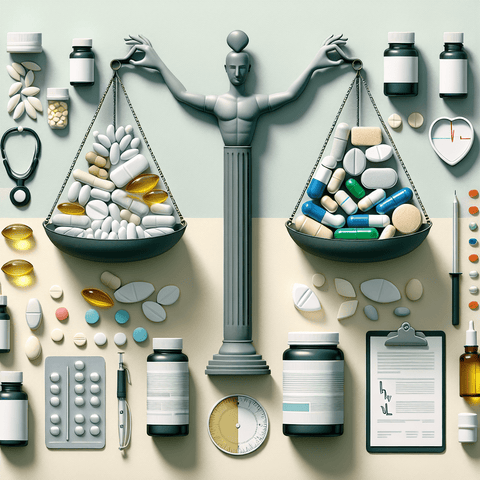Introduction
The global nutritional supplement industry is on an unprecedented uphill climb. With increasing awareness of health, fitness, immunity, and longevity, consumers are spending billions each year to "fill the gaps" nutrient-depleted diets may leave behind. From essential vitamins and minerals to herbal extracts and exotic blends, the appeal of self-optimization through supplements has never been more compelling. Supplement sales are projected to surpass $200 billion globally by 2028—an indicator of not just consumer interest, but also the extraordinary scale of this booming market.
But not all that shines is gold—or healthy. With the spotlight on wellness, an unfortunate reality shadows the supplement space: scams. Supplement scams exploit trust, prey on vulnerable individuals looking for solutions to real health concerns, and can jeopardize both physical health and wallet size. These are deceitful practices that promise miraculous outcomes, present forged testimonials, or even mask toxic ingredients behind eye-catching labels and unregulated jargon.
Knowing how to identify the warning signs of a supplement scam is crucial in today’s digital-first world. Whether it's spotting suspicious health claims, deciphering misleading labels, or discerning between genuine and counterfeit products, consumer awareness is the most effective defense against these retail traps. Since supplements are not as strictly regulated as pharmaceutical drugs, the responsibility to evaluate them lies heavily on the buyer's shoulders.
This blog post will serve as your definitive guide to identifying and avoiding supplement scams. Drawing on science-backed evidence and trustworthy practices, we will cover red flags in marketing, label deceptions, fake reviews, counterfeit risks, and more. With this knowledge, you can navigate the sea of wellness products confidently and responsibly—protecting your health, your trust, and your finances.
1. Understanding the Supplement Scam: How Nutritional Supplements Can Be Deceptive
Supplement scams can be broadly defined as deceptive marketing or manufacturing practices used to sell dietary or nutritional supplements under false pretenses. These can manifest in several disturbing forms—from fake ingredients and unauthorized health claims to forged certifications and intentionally misleading labeling. While the intention may vary among dishonest players, the end goal is often the same: profit, often at the expense of consumer safety.
The motivations behind supplement scams are largely rooted in the industry’s relatively lax oversight. Unlike pharmaceutical products, most dietary supplements are categorized as food items under European consumer safety laws. In the United States, supplements do not require pre-market approval by the FDA; European regulation varies similarly. This leaves the door open for unscrupulous manufacturers and marketers to sell products with little to no evidence of safety, efficacy, or even authenticity. Even scientific-sounding language or fancy chemical names might be used to make the product seem reputable when it's not.
Some of the most infamous frauds in supplement history have rocked consumer confidence. In 2013, research exposed several weight-loss supplements that contained illegal amphetamine-like substances. More recently, probiotic supplements falsely labeled as containing ‘clinically studied’ strains were found to contain none of the said strains. These cases are not just regulatory violations—they represent real public health threats. Harmful side effects, allergic reactions, drug interactions, or even toxic ingredients, such as sibutramine or anabolic steroids, have been found in some scam products.
In this post, we’ll explore six types of supplement scams:
- Deceptive marketing and labeling strategies
- Fake reviews and testimonials
- Counterfeit or bootlegged supplements
- Illegitimate or dangerous diet pills with unauthorized ingredients
- Scammed third-party sellers on online marketplaces
- Products boasting unverified, sensational health benefits
It's also worth noting that many of these frauds are not immediately obvious. That's what makes understanding and recognizing them early on so critical. Armed with proper insight, you can learn how to verify supplement integrity, identify genuine products from suspicious ones, and ultimately make smarter choices for your health.
2. The Trap of Fake Supplement Reviews: When Testimonials Deceive
Online reviews are a cornerstone of modern e-commerce. Shoppers trust ratings, testimonials, and personal stories to assess whether a product is effective, safe, and worth buying. Supplement companies understand this and sometimes exploit it. One of the most common fraud tactics involves fake or misleading customer reviews designed to trick consumers into buying ineffective—or worse, harmful—products.
These fake reviews often appear as glowing, generic blurbs: “This energy supplement changed my life!” or “Best product I've ever used—lost 10 kilos in two weeks!” While they may appear convincing at first glance, their repetitiveness, vague wording, or suspicious timing can raise red flags. It’s not unusual to find multiple five-star reviews posted within minutes of each other, full of identical phrases and unrealistically positive results.
Scammers often employ "review farms"—entities paid specifically to produce fake testimonials at mass. Sometimes, paid influencers or affiliate marketers push substandard supplement products in exchange for commissions. This can include scripted video endorsements, blog posts, or social media shout-outs with no actual product testing involved. Compounded with sponsored ads and flashy websites, the smoke and mirrors can appear very convincing.
To help verify review authenticity, you can use tools like Fakespot or ReviewMeta to analyze Amazon and other online reviews. These platforms apply algorithms to identify suspicious patterns in language, timing, and reviewer credibility. If a product’s ratings drop significantly after such analysis, it's a strong indicator of foul play.
Here are a few tips for discerning real reviews from fake ones:
- Look for specific, personal accounts, not generic praise.
- Be cautious if all the reviews are 5-star, with no mention of side effects or drawbacks.
- Check for verified purchase tags, but even these can be manipulated at times.
- See how the company responds to negative reviews—do they offer helpful resolutions or dismiss criticism?
Ultimately, unbiased, science-supported product descriptions and transparency should speak louder than manipulated testimonials. If you're looking for reliable supplements that put your health first, explore Vitamin C or Magnesium categories from reputable sources with real customer track records. At Topvitamine.com, customer reviews are manually reviewed to maintain integrity and support informed decision-making.
3. Counterfeit Supplements on the Market: What’s Really in That Bottle?
Counterfeit supplements represent one of the most hazardous and insidious threats in the nutritional product space. While they may look nearly identical to legitimate brands—complete with similar logos, colors, and packaging—the truth inside could be wildly different. Counterfeit products can contain inactive fillers, incorrect dosages, or even dangerous substances altogether. These aren’t just low-quality imitations—they can cause real harm.
One of the major reasons behind the widespread distribution of counterfeit supplements is the dominance of online retail platforms and unverified third-party sellers. On marketplaces, it’s not always clear who's really selling the product. Scammers can create listings under legitimate-sounding names or clone popular products, deceiving shoppers who assume they’re buying from reliable sources. Unfortunately, these counterfeit supplements regularly bypass minimal online platform quality checks and reach consumers every day.
Therefore, it's vital to look out for the tell-tale signs of a counterfeit product:
- Packaging inconsistencies: Misspelled words, faded print, skewed labels, or irregular fonts.
- Missing safety seals or tamper-evident closures.
- Capsules or tablets that differ in color, size, or odor from the official product description.
- Price too good to be true: Steep discounts compared to the brand’s official website or certified sellers.
One strong method to avoid counterfeits is purchasing directly from a trusted brand or verified retailer. For example, all supplement collections at Topvitamine.com are supplied by verified European distributors, ensuring both sourcing integrity and product quality.
If you suspect a supplement might be counterfeit, do not take it. Report the incident to consumer safety authorities and the retailer platform. Keep all packaging, receipts, and photos of the product to support your complaint. Remember, safety should never be compromised to save a few euros.
4. Recognizing a Supplement Fraud Warning: Red Flags That Should Raise Concern
Some supplement scams are boldly deceptive, while others are nuanced and manipulative. Knowing how to evaluate product marketing is essential to spotting fraud. Misleading claims, illegitimate endorsements, or aggressive sales tactics are often the first indicators. Here’s what you should never ignore:
Common Red Flag Phrases
- “Miracle Cure!” – No dietary supplement cures diseases, per EFSA guidelines.
- “Clinically Proven” – Look for actual studies; vague terms mean nothing.
- “Fast Results Guaranteed” – Body chemistry varies; guarantees are marketing traps.
- “Doctor Recommended” – Without verifiable credentials, this means little.
Scam products often also rely on scare tactics—emphasizing a danger or deficiency and positioning their product as the only solution. This manipulative psychology plays on fear to drive urgent purchases. Likewise, referencing celebrity endorsements or media coverage without links or verification is another warning light.
Here's how to verify supplement legitimacy:
- Check if the company or product is listed on certified directories (e.g., EFSA, EU Herbal Monographs).
- Look for quality verification like GMP-certified manufacture or third-party testing reports.
- Be cautious of flashy websites with limited contact information, vague product origin, or pressure-to-buy countdowns.
Though fraud lurks in the shadows, genuine products do exist. Trustworthy collections including Omega-3 DHA/EPA supplements provide lab-testing credentials and transparent certifications. Don't settle for ambiguity when robust, verifiable options are available.
5. Misleading Supplement Labels: Decoding What the Bottle is Really Saying
Slick packaging and sophisticated labeling aren't always trustworthy. Many supplement scams hide behind attractive branding and misleading language, deliberately crafted to sound scientific without offering any real scientific merit. Understanding how to read supplement labels is a crucial step to protect yourself against misinformation and false health promises.
Here are some key misleading tactics to look out for on supplement labels:
- Proprietary Blends: These are mixtures of ingredients “formulated” under brand secrecy. Unfortunately, dosages per ingredient are not disclosed, making it impossible to ensure you’re getting effective levels of any individual component.
- Natural or All-Natural: These terms are unregulated and often meaningless. Poison ivy is natural too—it doesn’t mean it’s safe.
- Doctor Recommended: Commonly used without any identifiable medical authority. No license or name—no credibility.
Scientific-sounding jargon, like "biooptimized molecules" or “dynamic enzymatic transporters,” enhances perceived legitimacy but is rarely tied to peer-reviewed research. Always verify any scientific claims through structured resources, such as the EFSA health claims register.
Understanding the Supplement Facts panel is vital:
- Is the dosage effective based on clinical recommendations?
- Are the ingredients clearly listed with amounts?
- Does the product note third-party testing for purity, contaminants, or potency?
All products on Topvitamine.com meet the European Union food safety criteria and transparently disclose ingredient profiles—especially across essential nutrients like Vitamin K for bone and cardiovascular health.
6. The Risks of Dangerous Diet Pills: Health Hazards Hidden Behind Slim Promises
Diet pills and fat-burning supplements make up one of the most fraud-ridden categories in the entire health industry. Fuelled by unrealistic body image ideals and the promise of instant weight loss, many products sold online are neither safe nor scientifically justified. Alarmingly, some contain banned or pharmaceutical compounds with harmful side effects.
Numerous health authorities (including the FDA and EU national regulators) have flagged diet pills containing substances like sibutramine, a stimulant withdrawn from the market due to cardiovascular risks, or DMAA, linked to seizures and heart attacks. These compounds are sometimes added secretly—unlisted on labels—further exposing consumers to unknown dangers.
The appeal of a “magic bullet” weight loss solution makes consumers more susceptible. These pills often claim to:
- “Melt belly fat without exercise”
- “Boost metabolism with no effort”
- “Burn fat 24/7 using thermogenic technology”
Consumers must remember: if it sounds too good to be true, it almost certainly is. Other warning signs include before-and-after photos with unverified origins, unrealistic timeframes for results, or anecdotal stories claiming “FDA approved” when no such approval exists for dietary supplements.
Instead, choose science-backed nutrients that support metabolism and wellness as part of a holistic nutritional plan. For example, magnesium contributes to normal energy-yielding metabolism, which is why our magnesium supplements are backed by transparent, EFSA-recognized information.
Conclusion: Staying Safe in a Market Full of Hype
Protecting yourself from supplement scams starts with knowledge and vigilance. Throughout this guide, we've outlined the core warning signs that every consumer should be aware of: fake reviews, counterfeit products, misleading marketing, deceptive labeling, and dangerous ingredients in diet pills. These fraudulent practices can harm your body, wallet, and trust in genuine science-based health solutions.
To navigate the massive nutritional supplement market safely, consider the following steps:
- Always research the brand and its history.
- Use third-party review verification tools.
- Buy from certified, trusted retailers like Topvitamine.com.
- Look for GMP certification, lab-tested validations, and clear labeling.
- Consult with a qualified healthcare professional before introducing a new supplement to your routine.
Additional reliable resources include the NIH Office of Dietary Supplements and EFSA Health Claims Register. These tools provide access to legitimate claims and nutritional standards.
In a world flooded with options, scams, and glossy marketing, reality often lies beneath the surface. Be a cautious, educated, and empowered supplement consumer. Because when your health is in question, cutting corners is never an option.
Q&A Section
Q: What are the top signs of a supplement scam?
A: Too-good-to-be-true claims, fake reviews, counterfeit packaging, vague “clinical” language, and lack of third-party certification.
Q: How can I check if a product is legitimate?
A: Verify through lab certifications, look for GMP marks, check EFSA claim alignment, and only purchase from approved vendors like Topvitamine.com.
Q: Are all diet pills dangerous?
A: Not all, but many contain untested or illegal ingredients. Always look for science-based supplements with safe EFSA-approved nutrient claims.
Q: Why are proprietary blends problematic?
A: Because they don’t list the exact amount of each ingredient, making it impossible to know dosing efficacy and safety.
Q: Is “doctor recommended” legit?
A: Only if it provides named credentials. Generic endorsements are often fabricated marketing tools.
Important Keywords
Supplement scam, fake reviews, counterfeit supplements, diet pill dangers, supplement fraud red flags, misleading labels, safe weight loss supplements, Topvitamine.com, nutritional supplement warning signs, buyer protection, vitamin safety, evidence-based supplements.



